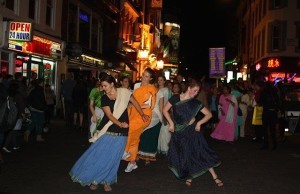Woman’s Day ( View on Krishna Conscious Woman)
The most advanced devotees in the Gaudiya Vaishnava teachings are the gopis, or simple village girls, of Vrindavan. Also, Jahnavi Devi, the wife of Nityananda Prabhu, took the role of an acharya, or teacher, after her husband left this world.
In the Srimad-Bhagavatam we see many great women devotees, such as Queen Kunti, Draupadi, Mother Yashoda, Devahuti, the wives of the yajnicbrahmanas, the naga-patnis or wives of Kaliya, and many more. Even Pingala, who was a prostitute, was able to attain self-realization by her devotional service.
A woman sincerely and seriously serving the Lord in whatever capacity she chooses should be honored and encouraged. In his Purport to Srimad-Bhagavatam 7.5.12, Prabhupada writes, “Everyone should be allowed to render service to the Lord to the best of his ability, and everyone should appreciate the service of others. Such are the activities of Vaikuntha [the spiritual world]. Since everyone is a servant, everyone is on the same platform and is allowed to serve the Lord according to his ability.” ( Lec. by Srila Prabhupada)
A little later, in the spring of 1970, when Srila Prabhupada was forming the Governing Body Commission (GBC) as the management arm of ISKCON, he included women on the list of disciples he was considering for the position.
When asked if a woman could become a temple president (Chicago, July 5, 1975), Srila Prabhupada replied, “Yes, why not?” and then explained that a woman should remain dependent on either her first-class father, first-class husband, or first-class son. (In the final analysis, only the Supreme Lord, Sri Krishna, is independent, but Vedic culture specifically enjoins that women should remain dependent on their intimate male relation.)
Here Srila Prabhupada states that a woman may be a temple president, but he also says that she also must be dependent. Is this contradictory? To gain some insight, we can turn to a conversation between Vallabha Bhatta, Advaita Acarya, and Lord Caitanya Mahaprabhu:
One day Vallabha Bhatta said to Advaita Acarya, “Every living entity is female [prakriti] and considers Krishna her husband [pati]. It is the duty of a chaste wife, devoted to her husband, not to utter her husband’s name, but all of you chant the name of Krishna. How can this be called a religious principle?”
Advaita Acarya responded, “In front of you is Lord Caitanya Mahaprabhu, the personification of religious principles. You should ask Him, for He will give you the proper answer.”
Hearing this, Lord Caitanya Mahaprabhu said, “My dear Vallabha Bhatta, you do not know religious principles. Actually, the first duty of a chaste woman is to carry out the order of her husband. The order of Krishna is to chant His name incessantly. Therefore one who is chaste and adherent to the husband Krishna must chant the Lord’s name, for she cannot deny the husband’s order.” (Caitanya- caritamrita, Antya-lila 7.103-7)
Similarly, under the guidance of her spiritual master, a chaste, Krishna conscious woman encouraged by her Krishna conscious father, husband, or son may render whatever service she’s qualified to do, whether as a mother, a cook, a temple president, a GBC, or a spiritual master.
In the Hare Krishna movement, Srila Prabhupada trained men to see all women except their own wife respectfully as “mother,” and women to see all men except their husbands respectfully as their “sons.” As the son’s duty is to protect his mother, so one of the duties of Srila Prabhupada’s men is to protect Srila Prabhupada’s women. A devotee-woman leader is protected by her husband and her “sons.”
Therefore in the Lord’s spiritual society and for His pleasure, a woman may do whatever service is suited to her. While this principle may seem straightforward and clear, to some it is a point of great controversy. They believe that a woman’s birth precludes her from doing certain services for the Lord, even though she may be qualified for them. Sometimes such thinking is culturally based. For example, traditionally in India women don’t perform certain Deity services in the temple—a standard Srila Prabhupada respected there. But often the thinking comes from the male ego, which Srila Prabhupada identified as “the temperament of always wanting to be in a superior position.” (Srimad-Bhagavatam 9.3.10, Purport).
To function successfully in such a difficult milieu, a woman spiritual leader must be astute, guileless, sensitive, soft-hearted, clear-headed, and fixed in Krishna consciousness, seeing herself as a servant of all. Her saving grace is her natural, humble service attitude, as well as her gracious and urgently needed contribution to Srila Prabhupada’s society.
Let us be enlightened by the perspective Srila Prabhupada reveals in this conversation:
Srila Prabhupada: In the spiritual platform there is no such distinction—man, woman, or black, white, or big or small. No. Everyone is spirit soul. Panditah sama-darshinah. Vidya-vinaya-sampanne brahmane gavi hastini shuni caiva shva-pake ca panditah. One who is actually learned is sama- darshinah. He does not make any distinction. But as far as our material body is concerned, there must be some distinction for keeping the society in order.
Woman: The women could become panditas, then?
Prabhupada: Oh, yes. Te ’pi yanti param gatim. Not only become—she can also attain perfection. There is no such restriction. Krishna said.
Woman: Do you have any panditas in the Western movement?
Prabhupada: There are so many Western women, girls, in our society. They are chanting, dancing, taking to Krishna consciousness. Of course, because superficially, bodily, there is some distinction, we keep women separate from men, that’s all. Otherwise, the rights are the same.” (June 18, 1976, Toronto)
[Source : krishna.com]



